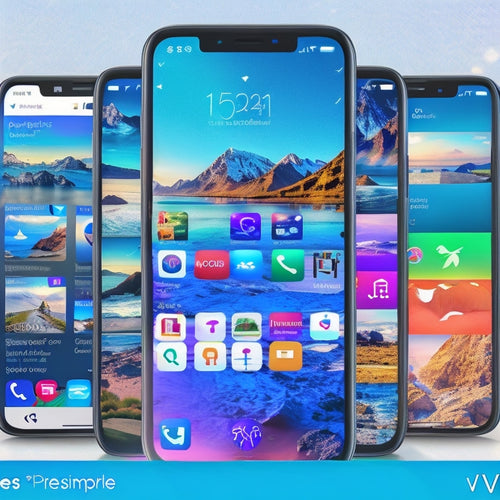
Backcountry's Private Brands: Hard Goods Merchant Update
Share
Backcountry's private brands rely heavily on the expertise of a Hard Goods Merchant to develop and execute brand and category strategies that drive business growth and meet customer demands. As a critical role, the Merchant is responsible for crafting a well-rounded Private Label Strategy, managing product assortments, and making data-driven decisions. The ideal candidate will possess strong analytical skills, industry expertise, and excellent communication skills to thrive in this dynamic environment. By understanding the Merchant's role, you'll gain insight into the complexities of private brand management; further exploration will reveal the intricacies of this critical position.
Key Takeaways
• As a Hard Goods Merchant, developing brand and category strategies is crucial for driving business growth and meeting customer demands.
• Assortment management is key to ensuring the right products are offered to meet customer needs and stay competitive in the market.
• Data-driven decisions are essential for success, and strong analytical skills are required to make informed decisions.
• Effective sample coordination is necessary for successful marketing initiatives and product launches.
• A strong understanding of financial and inventory positioning is required for exclusive products to ensure profitability.
Merchant Responsibilities Overview
Effective private brand management necessitates a multifaceted approach, wherein the Merchant assumes a pivotal role in developing and executing brand and category strategies that align with channel opportunities. A well-crafted Private Label Strategy is critical in driving business growth, and the Merchant plays an essential role in its development and implementation.
Assortment Management is a key aspect of this strategy, requiring the Merchant to carefully curate product offerings that meet customer needs and preferences. By aligning assortment, visual, and inventory strategies with channel opportunities, the Merchant can create a cohesive brand experience that drives customer loyalty and ultimately, revenue growth.
This multifaceted approach enables the Merchant to make data-driven decisions, mitigate risks, and capitalize on opportunities, ultimately contributing to the success of the private brand.
Key Tasks and Deliverables
The Merchant's key tasks and deliverables encompass a range of responsibilities, including developing brand and category strategies, aligning assortment, visual, and inventory strategies with channel opportunities, and informing Merchant and Planning teams of Divisional/Channel opportunities.
Effective assortment management is essential, ensuring the right products are offered to meet customer demands. Sample coordination is also crucial, as it enables the timely receipt of products for photo shoots and other marketing initiatives.
Additionally, the Merchant must create financial and inventory positioning for exclusive products, assess risks and opportunities, and develop action plans to mitigate or capitalize on them. By executing these tasks, the Merchant plays a significant role in driving business growth and profitability.
Ideal Candidate Profile
Possessing a unique blend of merchandising acumen, analytical prowess, and industry expertise, the ideal candidate will leverage their skills to drive business growth and profitability. They will develop and execute merchandising strategies that capitalize on product development opportunities, ensuring alignment with business objectives.
To excel in this role, the ideal candidate should possess:
-
Strong analytical skills to inform data-driven decisions
-
Proven experience in product development, retail, or eCommerce
-
Excellent communication skills to effectively collaborate with cross-functional teams
- Adaptability and flexibility to navigate a fast-paced and dynamic environment
Backcountry Company Culture
Backcountry's vibrant company culture is built on a foundation of six core values: Live the Gear, Be One Team, Pursue Excellence, Embrace the Unknown, Create with Intention, and Own It. These values guide our daily interactions and decision-making processes, fostering a collaborative and innovative work environment.
By living these values, we promote employee engagement, empowerment, and growth. Our company values prioritize safety, inclusivity, and diversity, ensuring a secure and respectful workplace for all employees.
Through regular feedback and open communication, we encourage our team members to embody these values, driving business success and personal development. By doing so, we create a positive and productive work culture that benefits both our employees and customers.
Upcoming Velocity Events
In the coming months, Velocity Events will host a series of conferences and summits aimed at fostering growth, innovation, and industry connections. These events will provide a platform for professionals to share knowledge, network, and stay updated on the latest trends and best practices.
-
Velocity Sustainability Summit: September 26-27, 2023 in Austin, TX, focusing on sustainability initiatives and eco-friendly practices.
-
Velocity Bold Bash: November 13, 2023 in Chicago, exploring bold marketing strategies and brand storytelling.
-
Velocity State of the Industry: December 14, 2023 (Free Virtual Event), discussing the current state of the industry and future prospects.
- Velocity Conference 2024: May 14-16, 2024 in Charlotte, NC, covering a broad range of topics, from marketing strategies to product development.
Frequently Asked Questions
What Is the Average Tenure of a Hard Goods Merchant at Backcountry?
Did you know that the average employee tenure in the retail industry is approximately 1.5-2 years? In contrast, the average tenure of a hard goods merchant at Backcountry is around 4-5 years, indicating a higher level of job satisfaction and stability.
How Does Backcountry Measure the Success of Its Private Labels?
Backcountry measures the success of its private labels through a combination of sales performance metrics, such as revenue growth and market share, as well as customer feedback, including ratings, reviews, and Net Promoter Score.
Can I Work Remotely as a Hard Goods Merchant for Backcountry?
As a Hard Goods Merchant at Backcountry, remote work arrangements may be possible, promoting job satisfaction and flexibility; however, discussing specific needs and expectations with the hiring manager is crucial to establish a mutually beneficial arrangement.
How Does Backcountry Approach Sustainability in Its Private Labels?
As the outdoor industry's environmental footprint grows, Backcountry prioritizes sustainable practices in its private labels through ethical sourcing, ensuring responsible supply chain management and minimizing ecological impact, aligning with customers' values and fostering a greener future.
Are There Opportunities for Career Growth Within the Merchandising Team?
Within the merchandising team, opportunities for career growth and skill development are available, focusing on career advancement through experience, retail math proficiency, and problem-solving skills, ensuring a safe and supportive environment for professional development.
Related Posts
-

10 Essential Integrations for Seamless Online Learning
You're already utilizing digital tools for online learning, but seamless experiences require more. You need to integr...
-

How Do I Increase Shopify App Installs
This article aims to provide informative and data-driven insights on the topic of increasing Shopify app installs. T...
-

Is Shopify a Good Place to Sell Digital Downloads
Shopify has become a popular platform for selling digital downloads, raising questions about its effectiveness in th...


